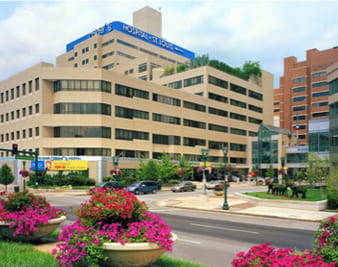Clinical training – St. Louis Children’s Hospital

In the first year, each fellow enters an intensive, comprehensive clinical program in pediatric gastroenterology, hepatology and nutrition designed to complete the full clinical training requirement. This includes approximately six months supervising the inpatient service and approximately six months on the outpatient and procedure service. During the first year, fellows also experience week-long electives. Additional electives can be arranged, depending on trainee interest.
Fellows also devote much time in the first year to learning how to scientifically approach clinical questions and critically review relevant medical literature. This process takes place during the division’s clinical conferences, approximately half of which are prepared and presented by the fellows.
During the second and third year, which are devoted to research, clinical training takes the form of a weekly continuity clinic. In the third year, fellows receive additional opportunities to hone their procedural skills. Both second and third year fellows spend approximately six weekends covering the inpatient service.
All clinical training takes place in the St. Louis Children’s Hospital. Founded in 1879, St. Louis Children’s Hospital is the oldest pediatric hospital west of the Mississippi River and one of the premier children’s hospitals in the United States. The hospital has served patients from all 50 states and 60 countries across the world. The Gastroenterology, Hepatology and Nutrition division cares for a broad range of patients in various settings, and fellows play a pivotal role in a large proportion of these encounters. Clinical settings include:
- Inpatient: includes a busy gastroenterology service and consultations on patients admitted to other services. Endoscopies and other procedures are performed as needed, and urgent procedures may be performed 7 days a week, at any time of day or night.
- Outpatient: includes a busy outpatient clinic and a pediatric ambulatory procedure center, where two full days each week are devoted to a variety of GI procedures.
Each year, our division cares for nearly 1,000 patients admitted to the Pediatric Gastroenterology Service and performs over 400 consultations on patients admitted to other services. We see nearly 10,000 patients in our outpatient clinics and perform over 900 upper endoscopies and 700 colonoscopies.

Our Liver Care center cares for patients with a wide variety of liver diseases and provides medical care for the liver transplant patients. The Liver Transplant Service is composed of a highly skilled team of dedicated pediatric transplant surgeons, hepatologists, a nurse practitioner, nurse coordinators and a social worker. Children from 21 different states have received transplants at our center; our waiting times average around two months, far below the national average. In fiscal year 2021, 17 liver transplants were performed in St. Louis Children’s Hospital.
In the Pediatric and Adolescent Inflammatory Bowel Disease Center, we currently follow 550 active patients from ages 2 to 25. Our center team consists of four pediatric gastroenterologists, a pediatric certified nurse practitioner, four dedicated registered nurses, a pediatric psychologist, a licensed social worker, a dietitian and a data co-coordinator. Two pediatric surgeons, a radiologist with MRE expertise and a pediatric pathologist add to our expertise. We organize the weekly outpatient sessions into a multi-disciplinary office visit to meet multiple needs at a single location. At a weekly conference, the center team reviews challenging outpatients and current inpatients. We are strong participants in the ImproveCareNow quality improvement network with 100% of our patients enrolled. Fellows actively participate in patient care for both inpatients and outpatients, and attend the weekly management conference. Additionally, the department provides medical staff for the regional summer camp for youth with IBD.
Our physicians have designed a clinical program for disorders of gastrointestinal motility including achalasia, Hirschsprung’s disease, constipation, encopresis and irritable bowel syndrome. This program brings together pediatric gastroenterologists, surgeons, and psychologists for comprehensive clinical care. Diagnostic modalities offered include esophageal and anorectal manometry and pH-impedance testing. We also provide biofeedback training for patients with fecal incontinence.